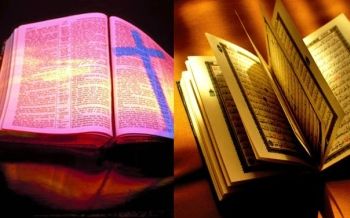 Ahmadiyya Times | News Staff | Faith & Logic
Ahmadiyya Times | News Staff | Faith & LogicSource & Credit: Examiner.com | January 5, 2010
By Lubna Malik | Chicago, IL
The first chapter of the Holy Qur'an is given various titles, including Al-Fatiha (the Opening), Al-Salat (the Prayer), Al-Hamd (the Praise), Umm al-Qur'an (Mother of the Qur'an), al-Qur'an al-Azim (the Great Qur'an), and Umm al-Kitab (Mother of the Book). By far, however, the most common name for the first chapter of the Holy Qur'an is Al-Fatiha, the Opening.
Although the method of how the chapters of the Holy Qur'an were named can vary, Al-Fatiha's name is strongly linked to a prophecy in the New Testament. We find in the last book of the New Testament, the Book of Revelation:
Then I saw another mighty angel coming down from heaven. . . . He was holding a little scroll, which lay open in his hand. (Rev 10:1-2)
The Hebrew word for "open" is "fatoah." In Arabic, this same word is "fatiha." The Book of Revelation continues:
When he shouted, the voices of the seven thunders spoke. (Rev 10:3)
It has been argued that these "seven thunders" that the Book of Revelation refer to are the seven verses of Al-Fatiha, the first chapter of the Holy Qur'an. Christian scholars have acknowledged that these verses from the Book of Revelation referring to "the angel" are actually referring to the second coming of Jesus Christ. Thus, it is believed that the second coming of Jesus Christ will accompany a strong emphasis on "the seven thunders," or Al-Fatiha. Not only would the second coming of Jesus Christ focus on these "seven thunders," but the second coming would illuminate the depth of these "seven thunders":
And when the seven thunders spoke, I was about to write; but I heard a voice from heaven say, 'Seal up what the seven thunders have said and do not write it down.' (Rev 10:4)
Thus, it would not be until the time of the second coming of Jesus Christ that the "seven thunders" could be adequately understood. So, although "Al-Fatiha" means "the Opening," it is possible that it was meant to be closed for many hundreds of years until the second coming of Jesus Christ when, finally, the true meaning of the first chapter of the Holy Qur'an would be opened.
Read the original article here: Al Fatiha Prophesized in the New Testament
Lubna Malik studies the Qur'an and how the manner in which its teachings are followed in today's society can benefit, or alternatively harm, Muslims and non-Muslims. Currently pursuing her J.D. at the University of Chicago Law School, Lubna received her A.B. from Princeton University in public policy and international affairs. During college, Lubna had the unique opportunity to study human rights at England's Oxford University.












No comments:
Post a Comment
Thank you for your comments. Any comments irrelevant to the post's subject matter, containing abuses, and/or vulgar language will not be approved.